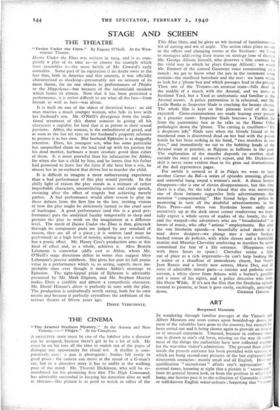THE CINEMA
The Arsenal Stadium Mystery." At the Astoria and New Victoria.—" Pieges." At the Cinephone.
A DETECTIVE story must be one of the haidest jobs a director can be assigned, because there's got to be a lot of talk He must be on his toes all the time to snatch out of the pages of dialogue any opportunity for visual wit. A thriller is com- paratively easy : a gun is photogenic : bodies fall easily in good poses : the camera can move at the speed of a G-man's car, but in a detective story it has to amble at the walking pace of the mind. Mr. Thorold Dickinson, who will be re- membered for his promising first film The High Command, has admirably succeeded in keeping his detection alive as well as obscure—this picture is as good to watch as either of the This Man films, and he gives us wit instead of facetiousness-. wit of cutting and wit of angle. The action takes place mainly in the offices and changing rooms at the Stadium : we listen to managers addressing their teams on strategy (one of them is Mr. George Allison himself, who deserves a film contract for the vivid way in which he plays George Allison): we watch Mr. Emmett of the canned Gaumont voice commenting on a match: we get to know what the jars in the treatment room contain—the sterilised horsehair and the rest : we learn where to look for a 'phone box and which passages lead to the ground. Then one of the Trojans—an amateur team—falls dead in the middle of a match with the Arsenal, and we move to Scotland Yard, but a Yard as undramatic and familiar as the Arsenal rooms. A police pantomime is in rehearsal, and Mr, Leslie Banks as Inspector Slade is coaching the beauty chorus. The whole film is kept on that pleasant level of the un- expected. Cross-examinations are made leaning over putters in a practice room : Inspector Slade borrows a Turkish fez from the pantomime box as he talks to the Home Office pathologist down the 'phone. The cutting is excellent—" It's a desperate job," Slade says when the blonde friend of the murdered man is discovered dead on her bed with the poison bottle he has been seeking in his hand, "two murders in two days," and immediately we cut to the bobbing heads of the Arsenal team at practice, as flippant as balloons in the park. The explanation of the murder depends on another death outside the story and a coroner's report, and Mr. Dickinson's skill is never more evident than in his grim sad dramatisation of the dull typewritten pages.
For awhile it seemed as if in Pihges we were to have another Carnet du Bal—a series of episodes amusing, ghastly and sorrowful hung round a woman's neck. A dance hostess disappears—she is one of eleven disappearances, but this time there is a clue, for she told a friend that she was answering one of those intimate suggestive little advertisements that mention "companionship." Her friend helps the police by answering in turn all the doubtful advertisements in the Paris Press—and when von Stroheim looms sadly and secretively up at the dark street corner rendezvous we hope- fully expect a whole series of studies of the lonely, the shy and the warped—the advertisers who are " broadminded " or lovers of music, who offer " artistic " employments. But after the von Stroheim episode—a beautifully acted sketch of a mad dress designer—we plunge into a rather broken- backed roman de policier, with white slavers and a homicidal maniac and Maurice Chevalier confessing to murders he never committed for fear of a life sentence. (Happiness wins with three hours to spare.) Chevalier seems a little out of place as a rich impresario—he can't help looking like a waiter or a chauffeur of immoderate charm, but there's Jean Renoir and a lovely new actress, Marie Dea, and al sorts of admirable minor parts—a sinister and pathetic man- servant, a white slaver from Athens with a barber's gentility and a sense of his rights, and a police detective who bob like Oscar Wilde. If it's not the film that the Stroheim episode seemed to promise, at least it goes easily, excitingly, amusingly






































 Previous page
Previous page